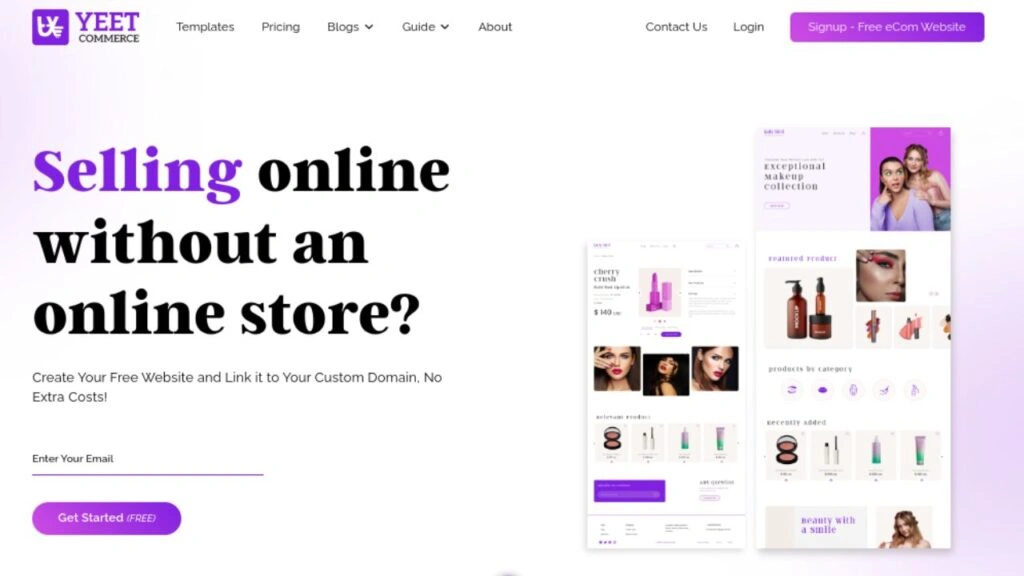The eCommerce landscape is constantly evolving, demanding businesses to adapt and innovate. While traditional strategies might have worked in the past, today’s consumers expect more. In this article, we explore the cutting-edge tactics adopted by the world’s most successful eCommerce companies. From personalized experiences to cutting-edge technology, discover the secrets that drive their growth and inspire your own business journey.
Analyzing Global eCommerce Success Stories
When it comes to eCommerce, some companies have risen to the top by mastering unique strategies that set them apart. In this section, we’ll dive into the success stories of four leading eCommerce giants—Amazon, Alibaba, Yeetcommerce, and Etsy—and uncover the secrets behind their success. Specifically, whether you’re a small business owner or simply curious about the eCommerce landscape, these insights might just inspire your next move. Therefore, understanding these strategies could provide valuable guidance and spark new ideas for your own eCommerce journey.
Amazon’s Global Strategy: Key Takeaways from Amazon’s Approach

Amazon‘s approach to global dominance is all about customer obsession, innovation, and adaptability. From its humble beginnings as an online bookstore, Amazon has transformed into a global eCommerce powerhouse by focusing relentlessly on customer satisfaction. You’ve probably noticed how easy it is to shop on Amazon, and that’s no accident. The company continuously invests in improving the user experience, from one-click purchasing to same-day delivery options.
Another key to Amazon’s success is its massive logistics network. By strategically placing fulfillment centers across the globe, Amazon ensures quick delivery, making it a preferred choice for millions of shoppers. And let’s not forget Amazon Prime—this subscription service has created a loyal customer base, driving repeat purchases and customer retention. If you’re looking to scale your business, Amazon’s strategy highlights the importance of customer focus and efficient logistics.
Alibaba’s Market Domination: What Makes Alibaba a Standout Player

Alibaba’s (https://www.alibaba.com/ )rise to market domination, particularly in China, is a masterclass in understanding local markets and leveraging technology. Jack Ma a founder of Alibaba,, understood the challenges faced by small businesses in accessing global markets. This insight led to the creation of Alibaba, a platform that connects businesses of all sizes with buyers across the globe.
One of Alibaba’s standout strategies is its remarkable ability to cater to diverse customer needs. Whether you’re a small business in a rural village or a large corporation, Alibaba offers tailored solutions. Moreover, the company’s ecosystem includes everything from online retail and wholesale marketplaces to cloud computing and digital payment services. As a result, this holistic approach has allowed Alibaba to dominate not just eCommerce but the broader digital economy as well.
For you, the key lesson here is to thoroughly understand your market and offer solutions that specifically cater to the unique needs of your audience. Furthermore, Alibaba’s success demonstrates that by being versatile and innovative, you can effectively capture and retain a wide range of customers.
Yeetcommerce’s Impact on Small Business: How Yeetcommerce Supports Entrepreneurs

While giants like Amazon and Alibaba dominate the headlines, platforms like Yeetcommerce are quietly making a significant impact, especially for small businesses and entrepreneurs. Yeetcommerce’s approach is centered around empowering small businesses to compete in the crowded eCommerce space by offering user-friendly tools and resources.
What sets Yeetcommerce apart is its strong focus on simplicity and accessibility. Specifically, you don’t need to be a tech expert to set up a professional online store with Yeetcommerce. The platform offers a range of customizable templates, as well as easy-to-use tools and integration options, that allow small businesses to create a strong online presence with minimal hassle. Additionally, Yeetcommerce provides excellent customer support, ensuring that entrepreneurs can easily overcome any challenges they face in the digital marketplace.
If you’re an entrepreneur, Yeetcommerce’s success story serves as a valuable reminder that having the right tools can make all the difference. By making eCommerce accessible to everyone, Yeetcommerce is actively helping small businesses thrive in a highly competitive landscape.
Etsy’s Community Focus: Building a Marketplace for Unique Items

Etsy’s success lies in its community-driven approach and focus on unique, handcrafted products. Unlike other eCommerce platforms that prioritize mass-market goods, Etsy has carved out a niche for itself by catering to creative entrepreneurs and small businesses offering one-of-a-kind items. Whether you’re shopping for handmade jewelry, vintage clothing, or custom art, Etsy provides a marketplace where creativity and craftsmanship take center stage.
What makes Etsy stand out is its strong commitment to supporting its sellers. Specifically, the platform offers a range of tools and resources to help sellers succeed, from marketing tips to business management tools. Moreover, Etsy fosters a sense of community among its users, encouraging buyers and sellers to connect and support each other. Consequently, this community focus has built a loyal customer base that values authenticity and craftsmanship over mass-produced goods.
For you, Etsy’s story is a testament to the power of niche marketing and community building. By focusing on a specific market and, furthermore, fostering a supportive community, Etsy has created a thriving marketplace that continues to grow.
Key Strategies Used by eCommerce Giants
The world’s leading eCommerce companies have thrived by implementing smart, effective strategies. Here’s how they do it:
1. Customer Obsession: Amazon’s Success Secret
Amazon’s top priority is customer satisfaction. For example, by streamlining the shopping experience with features like one-click purchases and fast delivery, Amazon keeps customers happy and loyal. Moreover, prioritizing customer needs can significantly boost your eCommerce success as well. Consequently, implementing similar customer-centric strategies can enhance your overall business performance and build lasting customer loyalty.
2. Data-Driven Decisions: Alibaba’s Winning Tactic
Alibaba excels by using data to understand customers and market trends. For instance, personalized shopping experiences, based on data insights, drive sales and customer loyalty. Furthermore, leveraging data in your business can help you make informed, growth-focused decisions. Consequently, applying data-driven strategies can enhance your ability to meet customer needs and boost overall performance.
3. Empowering Entrepreneurs: Yeetcommerce’s Approach
Yeetcommerce stands out by empowering small businesses with easy-to-use tools and strong support. By simplifying the eCommerce process, Yeetcommerce helps entrepreneurs succeed without needing technical expertise. Focus on providing user-friendly solutions to attract and support small business owners.
4. Community Building: Etsy’s Growth Strategy
Etsy thrives by fostering a community around unique, handcrafted items. By encouraging interactions between buyers and sellers, Etsy builds loyalty and engagement. Consequently, creating a sense of community around your brand can lead to stronger customer relationships and steady growth.
Learning from eCommerce Giants: Tips for Small Businesses
While the giants of eCommerce may seem unreachable, their strategies can offer valuable lessons for small businesses. By understanding their approach, you can implement effective tactics to grow your online store.
1. Customer-Centric Approach
Leading eCommerce companies prioritize customer satisfaction. Amazon’s founder, Jeff Bezos, encapsulates this with his famous quote: “We’re not competitor obsessed, we’re customer obsessed. We start with what the customer needs and we work backwards” (Forbes, 2022). Investing in understanding your target audience’s needs, preferences, and pain points enables you to tailor your products, services, and experiences accordingly. Remember, happy customers are loyal customers.
2. Seamless User Experience
A smooth and intuitive user experience is crucial for eCommerce success. Ensure your website is easy to navigate, loads quickly, and is mobile-friendly. Consider using a clear and consistent design, along with intuitive search and filtering options.
3. Effective Marketing Strategies
Leverage a combination of marketing channels to reach your target audience. Google’s former CMO, Lorraine Twohill, states, “Marketing isn’t about selling products, it’s about creating experiences that customers will remember” (Google Marketing Live, 2023). Utilize search engine optimization (SEO) to improve your website’s visibility in search results. Explore social media marketing to engage with customers and build a community. Consider email marketing for targeted promotions and personalized communications.
4. Strong Branding
A strong brand identity sets you apart from competitors. As Richard Branson, says, “Your brand is only as good as the people you have in it” (Entrepreneur, 2022). Develop a unique brand message, logo, and visual elements that resonate with your target audience. Consistency across all touchpoints is essential for brand recognition.
5. Mobile Optimization
With the increasing use of smartphones, mobile optimization is vital. Neil Patel, digital marketing expert, emphasizes, “Mobile optimization is no longer optional; it’s a necessity” (Neil Patel Blog, 2023). Ensure your website is fully responsive and provides a seamless experience on smaller screens. Consider developing a mobile app to enhance customer engagement.
6. Data-Driven Decision Making
Utilize analytics tools to track website performance, customer behavior, and sales data. As former Google Analytics head, Avinash Kaushik, notes, “Without data, you’re just another person with an opinion” (O’Reilly Media, 2022). Analyze this information to identify trends, optimize your marketing efforts, and make data-driven decisions.
7. Customer Loyalty Programs
Reward loyal customers with exclusive offers, discounts, and personalized experiences. Loyalty programs can increase customer retention and encourage repeat purchases. According to Forbes, “A well-structured loyalty program can boost customer retention by up to 30%” (Forbes, 2023).
8. Omnichannel Presence
Consider integrating online and offline channels to provide a seamless customer experience.Offer options like click-and-collect, in-store pickup, and return options to cater to customer preferences.
9. Continuous Innovation
Stay ahead of the curve by embracing new technologies and trends. As tech futurist, Brian Solis, puts it, “Innovation is the only way to stay relevant” (TechCrunch, 2024). Explore emerging opportunities like augmented reality (AR), virtual reality (VR), and voice search to enhance the customer experience.
10. Partner with Influencers
Collaborate with influencers in your niche to reach a wider audience and build credibility. Influencer marketing expert, Neil Schaffer, asserts, “Influencers have the power to transform brand perceptions and amplify your message” (Influencer Marketing Hub, 2024). Partnering with influencers can help you tap into new markets and generate buzz around your brand.
By implementing these strategies, small businesses can effectively learn from the success of leading eCommerce companies and position themselves for growth in the competitive online marketplace. Moreover, remember, it’s not just about following trends but also adapting them to your unique business and target audience. Consequently, customizing these strategies to fit your specific needs will help you stand out and thrive in the dynamic eCommerce environment.
Adapting Global Tactics to Local Markets
The strategies of leading eCommerce companies in the world, like Amazon, Alibaba, and Etsy, are impressive on a global scale. However, adapting these tactics to local markets is key to maximizing their effectiveness. Localizing your approach ensures you resonate with regional audiences and meet specific market needs. Here’s how you can adapt global strategies to fit your local context while keeping things light and practical.
Customize Your Offerings to Local Preferences
One size doesn’t fit all in the eCommerce world. While global giants often set trends, adapting their tactics to local tastes can make a huge difference. Amazon, for instance, tailors its product recommendations based on regional preferences and buying habits.
For your business, this means understanding what appeals to your local audience. Conduct market research to identify popular products and local trends. Adjust your product range accordingly, and consider offering region-specific items that cater to local tastes and preferences. By customizing your offerings, you can better meet the needs of your local customers and stand out from competitors.
Localize Your Marketing Strategies
Global eCommerce leaders excel at creating marketing campaigns that resonate across diverse markets. However, even the best strategies need localization to be truly effective. For example, Alibaba’s success in various countries is partly due to its ability to adapt marketing messages to fit cultural nuances and regional preferences.
To apply this to your small business, you should tailor your marketing efforts to reflect local culture and values. This could involve, for instance, translating your website into the local language, using culturally relevant imagery, or celebrating local holidays and events in your promotions. Additionally, engaging with local influencers or community leaders can help amplify your reach and build trust within the community. Ultimately, localizing your marketing strategy ensures your message hits the right notes and connects effectively with your audience.
Adapt Your Customer Service to Local Expectations
Customer service is a critical factor in eCommerce success. Notably, leading companies like Etsy excel by offering personalized and localized support. This includes, for example, understanding regional customer service expectations and providing timely, relevant assistance.
For your business, adapting customer service to local standards means offering support in the local language and understanding regional service norms. Additionally, this could involve setting up a local customer service team or partnering with local service providers. Moreover, ensure that your support channels, such as chat, email, and phone, are both accessible and responsive. By consistently meeting local customer service expectations, you not only enhance the overall shopping experience but also build stronger customer relationships.
Optimize Logistics for Local Efficiency
Logistics is another area where global strategies must be adapted to local conditions. For instance, Amazon’s success is partly due to its efficient, localized distribution network that ensures fast delivery. Similarly, this approach can be scaled down to fit your business model.
To begin with, evaluate your logistics and supply chain processes to find ways to improve local efficiency. This might involve, for example, partnering with local carriers or setting up regional distribution centers to reduce shipping times. Additionally, consider offering local delivery options or click-and-collect services to meet the preferences of your customers. Ultimately, by optimizing logistics for your local market, you can significantly enhance delivery speed and customer satisfaction.
Conclusion
The success stories of leading eCommerce companies like Amazon, Alibaba, Yeetcommerce, and Etsy highlight that there’s no universal strategy for success in the digital marketplace. For example, each company’s approach—whether it’s Amazon’s focus on customer experience, Alibaba’s data-driven decisions, Yeetcommerce’s support for entrepreneurs, or Etsy’s emphasis on community—provides valuable lessons. Therefore, by integrating these strategies and tailoring them to your specific market, you can position your business for long-term success. Ultimately, balancing global best practices with local relevance is key to creating a standout eCommerce presence.


















